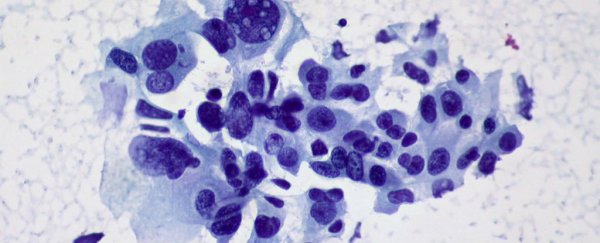Cancer cells are cells that cheat death - rather than growing old and dying, as healthy cells do, they continue to grow and divide, changing their metabolism to continue proliferating throughout the body. It's that proliferation of malignant cells that gives rise to cancers and tumours, and the challenge for medical researchers is to prevent this abnormal behaviour from occurring.
One way cancer cells fuel their growth and expansion is by increasing their glucose intake, and researchers are now looking at the possibility of shutting this down to combat their spread. A recent study has identified the PARP 14 protein as being responsible for the additional glucose production, and it's overproduced in virtually every human cancer, but isn't found in normal, healthy cells.
Genetic and molecular tests have shown that reducing PARP 14 levels in cancer cells literally starves them to death, as the UK-based team describes over at The Conversation. What's more, scientists have discovered that the level of PARP 14 also influences the chance of patients surviving cancer, and this could help doctors identify the aggressiveness of a particular cancer ahead of time and adjust the treatment accordingly.
While a PARP 14-inhibiting drug is still a long way from becoming a reality at the moment, the findings have the potential to make a huge difference in cancer treatments once the necessary development and testing has been completed. Unlike chemotherapy and radiotherapy techniques, a PARP 14 blocker would only affect the cancerous cells, so treatment would be much kinder to the patient's body.
The authors of the study, published in Nature Communications, believe that processes like chemotherapy would still be necessary, but a drug that targets the protein that cancerous cells rely on would make these cells much more vulnerable to chemo - as a result, doses could be lowered or programs could be shortened.
Glucose is so important to cancer cells because it not only gives them energy, it also guards against the molecules that cause natural cell death. If that glucose is removed, the cancer cells have their guard down. But it's not quite as simple as cutting out sugar from your diet, because cancer cells adapt to find alternative fuel sources to build up glucose levels.
Researchers need to first design a drug that blocks or reduces PARP 14, and then make sure it's safe and effective for humans, but our understanding of how cancer spreads - and how it can be stopped - is growing all the time, and the PARP 14 discovery could be one of the most important finds yet. "If we can find a way of stopping this over production of PARP 14 we can cure cancer," says one of the team, Salvatore Papa from the University of London.
